|
|
|
Sort Order |
|
|
|
Items / Page
|
|
|
|
|
|
|
| Srl | Item |
| 1 |
ID:
153842


|
|
|
|
|
| Summary/Abstract |
The Harmel review of 1966–7 is a story of how NATO collectively attempted to define a political role for itself; how France resisted; and how Germany was of two minds and hoped to resolve tensions by bridge-building. Much has changed since then—Britain is exiting the EU; Russia is an assertive but lesser power; the United States intends to pivot to Asia—but this underlying pattern remains. The cause hereof is a durable divide in French and German thinking on ‘political NATO’, meaning NATO as a framework for the coordination of key national security policies, as well as a framework that Europe's political organization cannot take place in opposition to. Political NATO was the foundation of the Harmel Report, and this certain idea of NATO continues to bedevil the Franco-German attempt to build Europe and refashion transatlantic relations. We should only take this effort seriously to the extent that the two countries have overcome their divide on political NATO. This article therefore explores the history and contemporary significance of French and German policy on political NATO and in particular three issues that dominated the Harmel Report: Europe's relationship with the wider Atlantic community, Russia's position in Europe's security order, and NATO's global engagement. While France and Germany have managed a certain rapprochement, the article concludes, their divide on political NATO continues to be of continental consequence.
|
|
|
|
|
|
|
|
|
|
|
|
|
|
|
|
| 2 |
ID:
153848
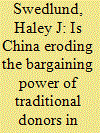

|
|
|
|
|
| Summary/Abstract |
In this article, the author explores whether the growing presence of Chinese financial assistance is decreasing the bargaining power of traditional donors vis-à-vis African governments. The article relies on data from an original survey of high-ranking donor officials working in multiple African countries, as well as case-studies of Chinese engagement in three diverse African country contexts: Ghana, Uganda and Tanzania. It finds that claims of a ‘silent revolution’ in development cooperation due to China's increased involvement in the region are overstated. Among donor officials, there is far from consensus that China is decreasing the bargaining power of their agency. On the contrary, evidence from Ghana, Tanzania and Uganda suggests that traditional development aid continues to play an important role and that, in practice, China rarely directly competes with traditional donors. There are, however, two important caveats to this claim. First, when China and traditional donors do directly compete—for example, on infrastructure projects—many recipient governments prefer assistance from China. Second, given China's interest in expanding markets and acquiring natural resources, countries receiving higher amounts of Chinese official finance are likely to have lower rates of aid dependence. As a result, financing from China is likely to be correlated with a decline in the bargaining power of traditional donors, even if it is not causing such a decline.
|
|
|
|
|
|
|
|
|
|
|
|
|
|
|
|
| 3 |
ID:
153843
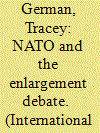

|
|
|
|
|
| Summary/Abstract |
The enlargements of the post-Cold War era have undermined NATO's stated objectives vis-à-vis the purpose of incorporating new members and exposed tensions within the alliance over the twin pillars of the 1967 Harmel Report, namely deterrence and dialogue. NATO's stance on enlargement has not only undermined Euro-Atlantic security and triggered new divisions between East and West, it has also exposed aspirant states, particularly those in the post-Soviet space, to sustained pressure and coercion from Moscow. This article examines the rationale for NATO enlargement in the post-Cold War era, focusing on the two post-Soviet aspirant states, Georgia and Ukraine. While these two states contribute, as partners, to the alliance's efforts to advance cooperative security, the issue of their prospective membership threatens to undermine alliance security and cohesion, and their ambitions are therefore unlikely to be realized in the foreseeable future. With Russia taking an increasingly assertive stance on the global stage and uncertainty surrounding the direction of US foreign policy under the presidency of Donald Trump, the issue of NATO enlargement is unlikely to be a priority for the alliance over the next few years. If NATO ultimately rejects any prospect of membership for states in the post-Soviet space, they could be abandoned to Russian influence, indicating that Moscow has a de facto veto over membership of the alliance and conceding spheres of influence to Russia.
|
|
|
|
|
|
|
|
|
|
|
|
|
|
|
|
| 4 |
ID:
153846
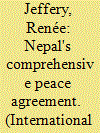

|
|
|
|
|
| Summary/Abstract |
In November 2006, the Government of Nepal and the Communist Party of Nepal-Maoist signed a Comprehensive Peace Agreement (CPA) designed to bring more than a decade of violent conflict to an end. At its heart stood a commitment to ending impunity for the significant number of human rights violations perpetrated during the conflict. In particular, by refusing to grant amnesties to perpetrators of human rights abuses and by agreeing to impartial investigations of alleged human rights crimes, Nepal seemed willing to embrace globally accepted anti-impunity and accountability norms. A decade on, however, impunity for human rights violations continues to prevail in Nepal, while accountability efforts are routinely resisted and even obstructed by members of the ruling elite. With this in mind, this article examines the range of factors that have allowed impunity to prevail over accountability in post-conflict Nepal. It argues that despite the efforts of the international community, civil society actors and local human rights activists to remove impunity guarantees from Nepal's peace agreement, shifting political dynamics, competing interests, and a genuine lack of political will have allowed impunity to flourish in the post-conflict period.
|
|
|
|
|
|
|
|
|
|
|
|
|
|
|
|
| 5 |
ID:
153850
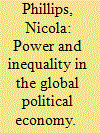

|
|
|
|
|
| Summary/Abstract |
Inequality in all its forms is the defining global problem and increasingly the defining political problem of our age. A monumental body of scholarly research seeks to understand the drivers behind the vast and accelerating patterns of socio-economic inequality in the global political economy. This article, an adapted version of the 2016 Martin Wight Memorial Lecture, contributes to this effort by focusing on a dimension of the picture which has received surprisingly little attention, namely, the implications for socio-economic inequality of the particular form of industrial organization that has come to underpin the contemporary global economy—one organized around global value chains and global production networks. It proposes an approach which sees inequality as arising at the intersections of three dimensions of asymmetry—asymmetries of market power, asymmetries of social power and asymmetries of political power—which underpin and crystallize around global value chains. It explores these dynamics in the particular arena of labour and labour exploitation in global value chains, as a means of shedding a valuable wide-angle beam on the big questions of power and inequality in the contemporary global political economy.
|
|
|
|
|
|
|
|
|
|
|
|
|
|
|
|
| 6 |
ID:
153852
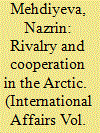

|
|
|
|
|
| Summary/Abstract |
The field of Arctic studies is becoming increasingly rich in empirical material across a broad array of topics and relationships, encompassing multiple international actors, both littoral and extra-regional. This article reviews three recent books on the Arctic, focusing on the evaluation of the potential for conflict in the region. Climate change will have long-ranging repercussions in the Arctic, where complex situations and choices will loom large, creating scope for international tensions. The scholarship demonstrates that there is much ‘old’ in the ‘new’ narratives of the North but at the same time posits that the region has been significantly less confrontational in the post-Cold War era than many observers predicted. Yet the Arctic is not hermetically sealed from other regions: international developments as well as the foreign policy ambitions of individual states, sometimes as remote as China, have been affecting emerging governance arrangements. In combination, the ‘spill-over effect’ of international crises and efforts by individual states to engage in sovereignty-enhancing exercises risk reducing cooperation among the states which have until now managed to maintain stability in the region.
|
|
|
|
|
|
|
|
|
|
|
|
|
|
|
|
| 7 |
ID:
153851
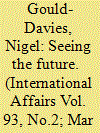

|
|
|
|
|
| Summary/Abstract |
A series of failed predictions, and the erosion of international order, augur an age of uncertainty. Rapid technological change is also fuelling anxiety about the ‘socio-material’ future of collective life. Demand for forecasting is now unprecedented. But the prediction industry has a poor record. Perverse incentives exacerbate the problem: the biggest pundits make the worst predictions. Some also worry that this industry legitimizes the preferred future of powerful interests. Forecasting should be a rigorous professional activity that is held to account, reviews its record and revises its practices. Complexity and chaos impose limits on prediction, but not decisive ones. Big data can play a big role, but needs the discipline of human judgement rich in history and detail. Organizations should create the incentives and culture that foster expert predictions which leaders listen to. This is hard, but good precedents exist. The costs of not doing so are demonstrably high.
|
|
|
|
|
|
|
|
|
|
|
|
|
|
|
|
| 8 |
ID:
153847
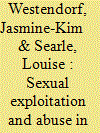

|
|
|
|
|
| Summary/Abstract |
In 2013, a UN investigation declared sexual exploitation and abuse (SEA) ‘the most significant risk to UN peacekeeping missions’. The exploitation and abuse of women and children by peacekeepers, aid workers, private contractors and other interveners has become ubiquitous to peace operations, ranging from rape to transactional sex, sex trafficking, prostitution and pornography. This article investigates the causes of SEA by interveners, and the development of policy responses undertaken by the UN and the international humanitarian community to prevent and ensure accountability for SEA. We argue that use of the umbrella term ‘SEA’, while helpful in distinguishing such behaviour from other forms of abuse, obscures the significant differences in the form, function and causes of the behaviours that fall under it, and we develop an account of the dominant forms SEA takes, based on survivor testimony, in order to better understand why policy responses have been ineffective. Our analysis of global policies around SEA demonstrates that it is dealt with as a discrete form of misbehaviour that occurs on an individual level and can be addressed through largely information-based training processes that inform personnel of its prohibition but fail to engage them in discussions of the local, international, normative, systemic and structural factors that give rise to it. We identify the structural and bureaucratic pressures that have contributed to the narrowing of approach regarding SEA to focus on individual compliance rather than the more complex set of factors at play, and which have undermined the effectiveness of policies globally.
|
|
|
|
|
|
|
|
|
|
|
|
|
|
|
|
| 9 |
ID:
153845


|
|
|
|
|
| Summary/Abstract |
The laws of war are under mounting pressure and yet recent developments in the ethics of war have encouraged a growing disjunction between ethics and the law. Is this a problem, and does just war have a responsibility to address it? How then should we think about the relationship between ethics and law in war? Focusing on the debates between orthodox and revisionist theorists about principles of liability and immunity in war, I argue that these are actually about competing conceptions of justness. Revisionists privilege a ‘best ethics’ approach to justness, whereas orthodox theorists tend to work within a more rounded conception that embraces the legal and political dimensions of the regulation of war. I argue that there is a danger that those revisionist theorists, despite their impressive ethical innovations, nonetheless operate in a reductive way that does little to assist with the contemporary plight of law, and may inadvertently offer but ‘miserable comfort’ to those caught up in the battlefield. In contrast, the just war tradition generally is rooted in a practice that makes greater allowance for a politically configured concept of war, and takes more seriously the requirement for effective law.
|
|
|
|
|
|
|
|
|
|
|
|
|
|
|
|
| 10 |
ID:
153841
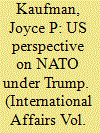

|
|
|
|
|
| Summary/Abstract |
As a new and unpredictable administration takes power in Washington, the relationship that the United States will have with its European allies remains unclear. There is understandably concern on both sides of the Atlantic about what this change will mean for the US relationship with NATO and the security guarantees that have been in place for almost 70 years. These concerns are not without foundation: just days before his inauguration, President-elect Trump once again described NATO as ‘obsolete’. Contradictory statements made by Trump and his candidates for Secretary of Defense and State raise further questions about the direction of US security policy, as well as the country's priorities. The Harmel Report was precipitated in part by the approaching 20th anniversary of the alliance in 1969 which caused NATO to rethink and redefine itself in light of changing realities. The incoming Trump administration is raising questions that are again exposing divisions among members of the Alliance which could prompt re-evaluation that could strengthen the institution by reaffirming its relevance in light of a resurgent Russia. Or the result could be to further the pattern whereby the United States pursues policies deemed to be in its own national interest at the expense of Europe, while simultaneously, the European countries develop their own policies, both individually and collectively, that minimize or exclude the United States. This article takes a historical perspective to explore the evolution of the trans-Atlantic relationship to the present and to speculate on what the past might tell us about the future.
|
|
|
|
|
|
|
|
|
|
|
|
|
|
|
|
| 11 |
ID:
153849
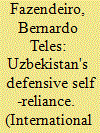

|
|
|
|
|
| Summary/Abstract |
President Islam Karimov's death provides an opportunity to gauge the origins and consequences of Uzbekistan's foreign policy. This article is aimed at contributing to that on-going conversation. To do so, it assesses the nature of Uzbekistani foreign policy, which the author categorizes as a type of defensive self-reliance, and to what extent the latter conditioned the government of Uzbekistan's international engagement. The author describes the main features of self-reliance and argues that the pursuit thereof led to five key trends: the relentless concern with international equality; a focus on bilateral relations; an aggressive defence of Uzbekistan's image; a drive for self-sufficiency; and a reluctance to embrace expansionist ideological agendas. To make his argument, the author begins by conceptualizing and distinguishing between ‘defensive’ and ‘offensive’ manifestations of self-reliance. He then traces the patterns of Uzbekistani self-reliance and concludes with a brief assessment of potential consequences were the foreign policy to change in the near future. The conclusion suggests that a shift from defensive to offensive self-reliance may constitute a problematic change to Uzbekistani foreign policy, but that relaxing any other of those trends may help open up the republic and the region of post-Soviet central Asia as a whole.
|
|
|
|
|
|
|
|
|
|
|
|
|
|
|
|
| 12 |
ID:
153844
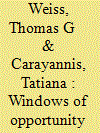

|
|
|
|
|
| Summary/Abstract |
Member states, nudged along by the 1-for-7-billion civil society campaign, made the selection process somewhat open and transparent for the ninth UN secretary-general. The campaign overlooked an essential consideration: on 1 January 2017 a ‘honeymoon’ began. The position still may be what the first secretary-general Trygve Lie called ‘the most impossible job in the world’, but the post-Cold War era has provided secretaries-general with significant possibilities for institutional housecleaning. History provides lessons for 2016's successful candidate. In looking to the next five years, it would be wise to examine how the last four UN secretaries-general pursued institutional change, and when they were effective in altering structures and staffing. The chances for conceiving significant change and starting the arduous path toward implementation are enhanced during the first months of a secretary-general's mandate and again in the twilight when the preoccupations are legacy and the scramble to complete unfinished business. The election of António Guterres provides the occasion to rekindle optimism about the potential for multilateral cooperation. He appreciates the flaws in the structure and staffing of the dysfunctional UN family and hopefully will have the determination to undertake the Sisyphean task of reforming them.
|
|
|
|
|
|
|
|
|
|
|
|
|
|
|
|
|
|
|
|
|